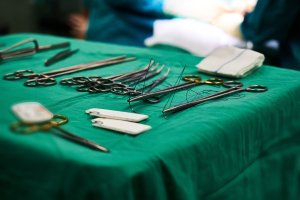We are committed to ending all forms of forced non-therapeutic genital cutting.
This includes female genital mutilation (FGM) and ritual circumcision of boys.
A child's right to bodily autonomy must not be overridden by other people's religious or cultural beliefs.
The National Secular Society supports a person's most fundamental right to grow up with an intact body and to make their own choices about permanent bodily modifications.
All forms of forced cutting on children's genitals breach basic child rights and safeguarding guidance.
Several communities have genital cutting traditions, often rooted in religious beliefs. But children, and particularly babies and young infants, are incapable of giving consent to such medically unnecessary, harmful, painful and permanent procedures.
Sometimes health benefits for non-therapeutic genital cutting are claimed despite the evidence to the contrary. All forms of forced genital cutting risk serious emotional, sexual, and physical harm – including death.
Child safeguarding must always be prioritised above the desire of adults to express their belief through forced cutting of children's genitals.
Female genital mutilation (FGM)
"It is irrelevant whether or not a person believed the operation to be necessary in the child's best interests as a matter of custom or ritual."
We are committed to the eradication of forced genital cutting of girls and women known as Female Genital Mutilation (FGM) in all its forms.
There are thought to be well over 100,000 women and girls affected by FGM living in the UK. We work with like-minded organisations to protect girls from the harm of forced genital cutting.
FGM practices vary. Some forms involve a pinprick or the removal of a small amount of tissue from the clitoris. Other forms include complete removal of the clitoris and labia, and stitching the vulva closed. Communities which practice FGM often cite religion as a motivation.
All forms of FGM are child abuse and are rightly illegal in the UK. But some British girls are still unprotected. Some have been sent abroad to undergo the procedure and others are having it performed secretly in this country.
There has been only one successful prosecution for FGM since it was banned in 1985. We are concerned that fear of upsetting cultural and religious sensitivities is preventing authorities from tackling FGM effectively.
"...a right specifically for African families who want to carry on their tradition whilst living in this country"
As with all forms of forced genital cutting, those who speak out against FGM are often accused of disrespecting their parents or cultural heritage, and of over-dramatising a 'minor' procedure that others 'don't complain about'. Together with the perceived humiliation of speaking about one's own genitals, these factors combine to ensure that many sufferers are reluctant to speak out.
Ending FGM requires sustained civil society action to change attitudes and inform girls of their rights.
Male circumcision
While all forms of FGM are rightfully banned, non-therapeutic circumcision of boys is permitted in UK law.
The foreskin is a normal body part with physical, sexual and immunological functions. Removing it from non-consenting children has been associated with various physical and psychological difficulties. These are likely to be greatly under-reported because people who have experienced sexual harm are often reluctant to reveal it as societal dismissal or stigmatisation may compound the harm.
Circumcision is excruciatingly painful. When performed on babies, little to no anaesthesia is used. Even when performed under anaesthesia on older children, the recovery entails weeks of pain and discomfort.
The procedure is also dangerous. Between 1988 and 2014, there were 22,000 harms recorded by the NHS resulting circumcision. They included scarring and full penis amputation. In 2011, nearly a dozen infant boys were treated for life-threatening haemorrhage, shock or sepsis as a result of non-therapeutic circumcision at a single children's hospital in Birmingham. In 2007, a newborn baby went into cardiac arrest minutes after he was circumcised in a London synagogue, and subsequently died.
Any claims of marginal health benefits of circumcision are extremely contested. No national medical, paediatric, surgical or urological society recommends routine circumcision of all boys as a health intervention. There is now growing concern among doctors that existing ethical principles of non-therapeutic childhood surgery should no longer include an exception for non-therapeutic circumcision.
62% of Brits would support a law prohibiting the circumcision of children for non-medical reasons. Only 13% would oppose it.
There is very limited regulation of non-therapeutic circumcision in the UK. We do not know how many such procedures are performed annually or the degree of harm, as there is no requirement for any follow up or audit and the boys themselves are too young to complain.
It is now being recognised more widely that non-therapeutic religious and cultural circumcision is a breach of children's rights. We want to see the same protections for girls' bodily autonomy extended to boys.
Take action!
1. Write to your MP
Ask your MP to support an end to non-consensual religious genital cutting
2. Share your story
Tell us why you support this campaign, and how you are personally affected by the issue. You can also let us know if you would like assistance with a particular issue.
3. Join the National Secular Society
Become a member of the National Secular Society today! Together, we can separate religion and state for greater freedom and fairness.
Latest updates
Religious and cultural genital cutting challenged at NSS event
Posted: Fri, 17 Jun 2022 12:21
Experts made the case for protecting all children from religious and cultural genital cutting at a recent National Secular Society online event.
On Wednesday 8th June, representatives from the International NGO Council on Genital Autonomy (INGOCGA) led an online discussion on their new report, supported by the NSS, which calls on the United Nations to take greater steps to eliminate all forms of non-consensual, non-therapeutic genital cutting.
Every year, millions of children are forcibly subjected to permanent and painful cutting of their genitals for religious or cultural reasons.
While increasing numbers of countries give girls legal protection from all forms of non-therapeutic genital cutting (female genital mutilation), not a single country affords similar protections to boys.
Secular Medical Forum chair Dr Antony Lempert and Canadian government medical adjudication consultant Kira Antinuk explained why forced genital cutting is a violation of children's fundamental rights, including freedom of religion or belief, and dispelled some of the myths surrounding FGM and male circumcision. They also shared ideas on what needs to happen to ensure all children, whatever their sex or cultural background, are given equal rights to make decisions about their bodies for themselves.
You can watch the video of the discussion here.
Speaker biographies
Dr Antony Lempert, Secular Medical Forum (Chair)
Dr Antony Lempert is a partner in a rural GP practice on the Welsh/English border. Since 2008 he has coordinated and chaired the SMF which works to protect patients from the harm caused by the imposition on them of other people's personal beliefs. Dr Lempert is a British Medical Association representative, and chairs the Shropshire division of the BMA.
Kira Antinuk, RN BScN MN
Kira Antinuk lives on Vancouver Island in Canada, where she works as a Medical Adjudication Consultant for the federal government. She also serves as the Executive Director of the Children's Health & Human Rights Partnership, a non-profit organisation of professionals in the fields of medicine, ethics, and law who are committed to ending non-therapeutic genital surgery on children in Canada.
Special thanks to Richard Duncker, of Men Do Complain, for editing the video. Please support his work at Men Do Complain and his Vimeo channel.
Image: esudroff, Pixabay.
Arrests made at unregistered school over FGM concerns
Posted: Fri, 13 May 2022 14:16
The National Secular Society has expressed shock that female genital mutilation has been suspected at an unregistered school.
Police investigated the school in Birmingham on Tuesday after Ofsted inspectors raised concerns about "possible illegal practices".
The inspectors found a locked room with a bed and medical equipment at the unregistered school, according to Mail Online. Police said two men had been arrested on suspicion of being involved in female genital mutilation.
A third man was arrested yesterday as part of the investigation. All three men have been bailed with "strict conditions".
Female genital mutilation (FGM)
Female genital mutilation (FGM) is a procedure where the female genitals are deliberately cut for non-medical reasons. Some Muslims consider it a religious requirement.
All forms of FGM are illegal in the UK.
A 2015 study estimated that around 60,000 girls aged 0-14 were born in England and Wales to mothers who had undergone FGM. It also found that around 10,000 girls aged under 15 who have migrated to England and Wales are likely to have undergone FGM.
Unregistered schools
It is illegal to run a full-time school without registering it with the Department for Education.
However, some religious groups operate unregistered schools in order to prioritise religious inculcation while avoiding scrutiny under the independent school standards.
This enables unregistered faith schools to teach a strictly religion-only curriculum, including extremist content, and to subject children to harmful activities including corporal punishment.
On Tuesday a bill was announced in the Queen's Speech that would give the government greater powers to tackle unregistered schools.
NSS comment
NSS chief executive Stephen Evans said: "We've known for a long time that unregistered schools expose children to harm. But the idea that children may be subjected to female genital mutilation at these schools is horrific and disturbing on a whole new level.
"FGM is a barbaric and torturous procedure that causes lifelong pain and suffering.
"This shocking incident demonstrates a much more robust approach to illegal schooling and harmful cultural practices is necessary to uphold the human rights of children, particularly those growing up in insular religious communities."
Image: Engin Akyurt from Pixabay




